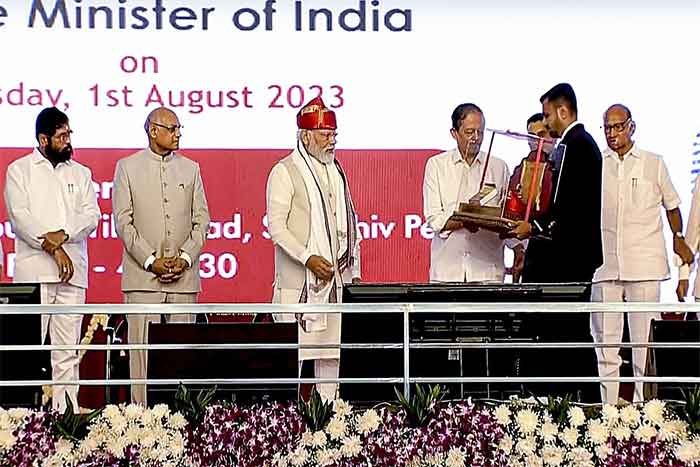
Mr Sharad Pawar will share the dais with Bhalchndra Nemade, Jnanpith award winner novelist and Ashok Vajpayee one of our few bureaucrats who has an understanding of culture and he is a poet as well. That will be on August 5 to mark the 125th anniversary of Mumbai Marathi Granth Sangrahalaya library in Dadar. Sounds so much better than Mr Pawar’s sharing the dais with Prime Minister Narendra Modi in Pune yesterday, sadly on the occasion of the death anniversary of Lokmanya Tilak and presentation of an award in memory of Tilak to Mr Modi.
The award was given in the past to the likes of Indira Gandhi, Manomohan Singh, A.B. Vajpayee and others who had a much better understanding of culture. The Nazis, with all their crimes, at least some leaders among them, had a good understanding of Western classical music. Much of the present BJP leadership has a heavy deficit on this score .
Even in the interpretation of ancient Indian history and culture, major and important work is done by left wing, Communist scholars.
The Granth Sangrahalaya organised two seminars last week one on Marathi literature in the last 25 years and another on the economic , social aspects of the state. It was a pleasant surprise to find detailed presentation of written papers particularly in the literature session. It is amazing to find in so many big conferences where enormous amounts of money is spent but no papers are presented, all we get are some sketchy power point presentations and boring charts and graphs masquerading as a sign of scholarship instead of a more accessible content. Sometimes at the most one can get an abstract of a presentation a year later.
As for Tilak, some people pointed out today a newspaper report on Tilak’s cremation that after a huge procession in Mumbai a Muslim jumped into the funeral pyre out of grief and he was taken out.
The discussion at MMGS on literature was launched by veteran novelist Madhu Mangesh Karnik who is now nearly 90 but is fairly active. He used to be a regular choice for presiding over literary conferences like Prof Anant Kanekar in the earlier days who belonged to more progressive days and he authored a book on life in the Soviet Union.
Karnik decried a tendency to tar all Brahmin writers as Brahminical, he said there were many Brahmin writers who were very progressive. Poet Vasant Bapat had strongly rebutted Bal Thackeray’s dismissal of Marathi writers as bullocks.
Dr Bhalchandra Mungekar, vice president of the Granth Sangrahalaya and former Planning Commission member, said Dr Ambedkar had described Brahminism, not all Brahmins, and capitalism as the main enemies of people.
Among writers Namdeo Dhasal,Vijay Tendulkar among others did much to challenge Brahminical hegemony.
Another interesting point mentioned during the deliberations was that while the Brahmins enjoyed a dominant position as progressive social thinkers in the past their presence in this sphere now is marginal. A point not mentioned was that many Brahmins have now switched to careerism, to technology and pursuit of money than knowledge acquisition, rather than a spirit of questioning, inquiry.
Pramod Munghate , head of the department of Marathi in Nagpur university, said a new development in fiction writing was that some writes were depicting the problems of farmers, suicides, rural ecology and so on. This was seen in the works of Sadanand Deshmukh in the novel Baromas, then of Rajan Gavas and Krishna Khot.
Nanda Khare, a novelist and intellectual, looked at history from the perspective of common people rather than rulers.
Narayan Bhosale, a scholar known for his work on nomadic tribes, said these people had been completely marginalised, their lot was much worse than of other castes, their number in India was nearly 25 crore with barely one per cent of them literate in a country where the welfare state was shrinking.
Ganesh Visputay, poet and artist, said in some respects Hindi literature showed greater social concern than in Marathi.
It was also pointed out that Shafaat Khan’s play Shobha Yatra and C.P. Deshpande’s play Dhol Tashe had critically potrayed the use of processions for religious purposes much before this became a major social problem.
The contribution of Rajeev Naik to literary criticism and theatre witing and of Makarand Sathe to drama and of Sanjeev Khandekar to poetry and criticism as also of many others was also hailed during the proceedings.
The deliberations were organised with the efforts of a number of scholars including Shraddha Kumbhojkar, head of the department of history, Savitribai Phule university and Nitin Rindhe.
Vidyadhar Date is a senior journalist, culture critic, and author of a book on public transport









































